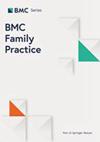Exploring how people achieve recommended levels of physical activity, despite self-reported economic difficulties: a sense of coherence perspective
IF 3.2
3区 医学
Q1 MEDICINE, GENERAL & INTERNAL
引用次数: 0
Abstract
The salutogenic theory forms the basis for health promotion and describes health as a continuum from a dis-ease pole of health to an ease pole. The core concept for the salutogenic theory is sense of coherence (SOC). For a strong SOC, general resistance resources, such as solid economic situation, are essential. The aim was to explore how people – despite self-reported economic difficulties – comprehend, manage and find it meaningful to achieve the level of physical activity recommended by World Health Organisation (WHO). The study is based on interviews with people achieving the recommended physical activity (PA) level despite economic difficulties. The interviews were conducted at primary health care centres and family centres after a targeted health dialogue. We used a qualitative deductive content analysis based on sense of coherence as the main category, with the three generic categories of comprehensibility, manageability and meaningfulness. The findings elucidate a pattern of a process. In this process, the participants comprehend their knowledge of the health benefits of PA and have a plan for performing their PA. They utilise their resources in order to manage to apply their knowledge and plan for PA in their lives despite their challenges. When PA becomes meaningful to them, they have an intrinsic motivation to perform it and experience its benefits. This study suggests a possible process that might help in achieving the recommended PA level among people with economic difficulties and other challenges. The findings might be used in health promotion work, such as targeted health dialogues in primary health care, to reduce health inequalities when supporting people who are not achieving the recommended levels of PA. Not applicable.探索人们在自述经济困难的情况下如何达到建议的体育锻炼水平:协调感视角
致乐理论是促进健康的基础,它将健康描述为一个从健康的 "失调极 "到 "轻松极 "的连续体。致乐理论的核心概念是协调感(SOC)。对于强大的 SOC 而言,稳固的经济状况等一般抵抗资源是必不可少的。本研究旨在探讨人们在自述经济困难的情况下,如何理解、管理并认为达到世界卫生组织(WHO)建议的体育锻炼水平是有意义的。本研究基于对经济困难但仍能达到推荐体育锻炼(PA)水平的人进行的访谈。访谈是在有针对性的健康对话之后,在初级卫生保健中心和家庭中心进行的。我们采用了定性演绎内容分析方法,以连贯感为主要类别,加上可理解性、可管理性和有意义性三个通用类别。分析结果阐明了一个过程的模式。在这一过程中,参与者理解了他们对 PA 健康益处的认识,并制定了进行 PA 的计划。他们利用自己的资源,设法在生活中应用 PA 知识和计划,尽管面临挑战。当运动对他们有意义时,他们就会产生进行运动并体验其益处的内在动力。本研究提出了一个可能的过程,该过程可能有助于经济困难和面临其他挑战的人群达到建议的 PA 水平。研究结果可用于健康促进工作,如在初级卫生保健中开展有针对性的健康对话,以在支持未达到建议的 PA 水平的人群时减少健康不平等现象。不适用。
本文章由计算机程序翻译,如有差异,请以英文原文为准。
求助全文
约1分钟内获得全文
求助全文
来源期刊

BMC Family Practice
医学-医学:内科
CiteScore
3.20
自引率
0.00%
发文量
0
审稿时长
4-8 weeks
期刊介绍:
BMC Family Practice is an open access, peer-reviewed journal that considers articles on all aspects of primary health care research. The journal has a special focus on clinical decision making and management, continuing professional education, service utilization, needs and demand, and the organization and delivery of primary care and care in the community.
 求助内容:
求助内容: 应助结果提醒方式:
应助结果提醒方式:


